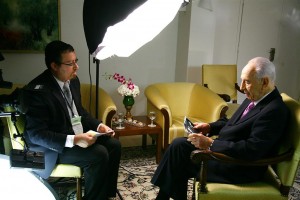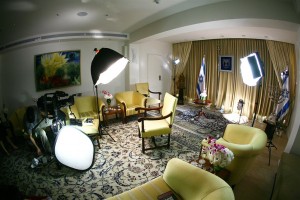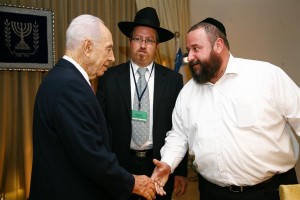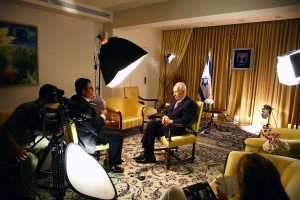‘My Encounter’ Catches Up with Israeli President
18 July 2012
Forty-six years after Israel’s current President, Mr. Shimon Peres, met the Rebbe in a private audience at 770, he spoke about it on the record for the first time, sharing previously-unknown details about their conversations and correspondence.
It has long been known that the Rebbe received Peres for an audience in 770 during January of 1970, but it was largely unknown that his first meeting with the Rebbe took place four years earlier, in 1966.
Prior to interviewing JEM’s My Encounter with the Rebbe team conducted several months of research in New York and Israel. After learning about the two audiences, the team studied whatever details were available, uncovered photos of Mr. Peres’ at 770, as well as correspondence between the Rebbe and Peres.
With this information in hand, Reb Zalman Wolff, a Chabad activist who maintains friendly ties with Israel’s government leaders, contacted the President’s staff to facilitate the interview. The President expressed interest in recording his testimony, and a date was set. However, a series of events postponed the meeting, including the passing of the President’s wife, Mrs. Sonya Peres,and an emergency surgery for Mr. Peres, who is in his 89th year of age.
Finally this week, the My Encounter with the Rebbe team was hosted for an interview at the Beit Hanasi in Jerusalem, where President Peres discussed the full details of his relationship with the Rebbe.
Coming two weeks after the release of Faithful and Fortified: Israel’s Prime Ministers, in which five Prime Ministers – Rabin, Begin, Sharon, Shamir and Netanyahu – speak of the Rebbe’s interactions and guidance to them, Peres’ interview provides yet another prism on the Rebbe’s deep relationship with Israel’s government and military leaders. Many of their testimonies have been documented over recent years thanks to a generous grant from Rabbi Yossel Gutnick of Melbourne, Australia.
The cost of the interview – including research, cinematography, lighting and sound, was sponsored by Mr. Sholom and Pessy Jacobs.
Rabbi Yechiel Cagen, Director of JEM’s My Encounter with the Rebbe oral history project, explained, “We had originally hoped to include his interview in the new film alongside the Prime Ministers, but with so much material already prepared for the film, we decided not to wait for the President’s interview. There will be many more volumes in the Faithful and Fortified series, and we’ll be able to include Mr. Peres’ full interview in one of them.”
From the dozens of testimonies collected, a picture emerges of the Rebbe’s keen ability to connect with those who were not like-minded, managing to find issues of common ground and to inspire even self-proclaimed agnostics. These connections spanned the entire political spectrum – from those in sync with the Rebbe’s views to those, such as Peres, on the political left.
“The aim of the My Encounter with the Rebbe project has been to document the history of the Rebbe and the evolution of the Chabad-Lubavitch movement in modern times,” explained JEM’s Director, Rabbi Elkanah Shmotkin. “If we would only interview those who agreed with the Rebbe on every issue, we’d miss many important events and perspectives. istory is made up of different types of people with varying opinions and viewpoints, and the My Encounter team has done a phenomenal job locating and recording testimonies spanning ethnicities, continents, and viewpoints. As an important player in Israel’s government for over sixty years, the testimony shared by President Peres is important to the historic record.”
The session with Peres was conducted by My Encounter with the Rebbe’s lead interviewer in Israel, Rabbi Zusha Wolff.
Peres explained that the 1966 audience was suggested by Mr. Yossi Ciechanover, at the time, a legal adviser to the Israel’s Defense Department. Peres enthusiastically accepted the opportunity. “I had heard a lot about the Rebbe, and I wanted to meet him.”
The first meeting lasted over an hour, with the conversation taking place in English, Yiddish and Hebrew.
It was some 15 months before the outbreak of the Six Day War, and Egypt was growing increasingly antagonistic and threatening toward its Jewish neighbor to the south. In Peres’ words, “the world was ready to eulogize Israel.” At the time however, the anti-Israel sentiment of the Egyptian masses had a more political, and less Islamic, flavor that the animosity of today.
Addressing the relations between the two countries and the prospect of war hanging over the region, the Rebbe urged Peres to view the problem of Egypt as a personal, rather than national, confrontation. “The Rebbe began to discuss with me what we should do about [Egyptian President] Abdul Nasser. He asked me, ‘Why do you need to wage war with Egypt? Take care of this one person, Nasser. You won’t need entire armies to do this.’”
Of course, Nasser’s provocations continued, and the IDF would deliver a resounding victory over the armies of Egypt, Syria, and a number of their neighbors. The Rebbe would later call Israel’s victory in the Six Day War ‘G-d given and miraculous.’
Four years later, during their 1970 meeting, the Rebbe spoke with Peres about matters standing at the center of Israeli life, including “Who is a Jew?,” absorbing the mass immigration from Russia, Jewish education and the Jewish identity of the State.
At that time Peres was Israel’s Minister of Transportation and Communications, and the Rebbe addressed the importance of connecting the two roles of transportation and communication. “He said we must use modern communication – at the time, radio, telephone and television – to facilitate Jewish education.”
Referring to his political positions – often at odds with those of Chabad, Peres said, “Unfortunately, the Chabad movement did not support me politically. But I value the Rebbe’s outstanding leadership and his great inspiration.”
“The Rebbe’s was unique in the fact that he merged the spiritual and the practical. He saw the future as clearly as the present. When he looked at the present, he understood our immediate security challenges, and at the same time, he endeavored to meet the future by investing in education. He recognized the gap between the present and the future, but urged us not to allow ourselves any gap in our action.
“He dealt with our present and the future with equal urgency, because they cannot be separated. And [he held that] any separation between them presents a danger.”
Forty-six years after Israel’s current President, Mr. Shimon Peres, met the Rebbe in a private audience at 770, he spoke about it on the record for the first time, sharing previously-unknown details about their conversations and correspondence.
It has long been known that the Rebbe received Peres for an audience in 770 during January of 1970, but it was largely unknown that his first meeting with the Rebbe took place four years earlier, in 1966.
Prior to interviewing JEM’s My Encounter with the Rebbe team conducted several months of research in New York and Israel. After learning about the two audiences, the team studied whatever details were available, uncovered photos of Mr. Peres’ at 770, as well as correspondence between the Rebbe and Peres.
With this information in hand, Reb Zalman Wolff, a Chabad activist who maintains friendly ties with Israel’s government leaders, contacted the President’s staff to facilitate the interview. The President expressed interest in recording his testimony, and a date was set. However, a series of events postponed the meeting, including the passing of the President’s wife, Mrs. Sonya Peres,and an emergency surgery for Mr. Peres, who is in his 89th year of age.
Finally this week, the My Encounter with the Rebbe team was hosted for an interview at the Beit Hanasi in Jerusalem, where President Peres discussed the full details of his relationship with the Rebbe.
Coming two weeks after the release of Faithful and Fortified: Israel’s Prime Ministers, in which five Prime Ministers – Rabin, Begin, Sharon, Shamir and Netanyahu – speak of the Rebbe’s interactions and guidance to them, Peres’ interview provides yet another prism on the Rebbe’s deep relationship with Israel’s government and military leaders. Many of their testimonies have been documented over recent years thanks to a generous grant from Rabbi Yossel Gutnick of Melbourne, Australia.
The cost of the interview – including research, cinematography, lighting and sound, was sponsored by Mr. Sholom and Pessy Jacobs.
Rabbi Yechiel Cagen, Director of JEM’s My Encounter with the Rebbe oral history project, explained, “We had originally hoped to include his interview in the new film alongside the Prime Ministers, but with so much material already prepared for the film, we decided not to wait for the President’s interview. There will be many more volumes in the Faithful and Fortified series, and we’ll be able to include Mr. Peres’ full interview in one of them.”
From the dozens of testimonies collected, a picture emerges of the Rebbe’s keen ability to connect with those who were not like-minded, managing to find issues of common ground and to inspire even self-proclaimed agnostics. These connections spanned the entire political spectrum – from those in sync with the Rebbe’s views to those, such as Peres, on the political left.
“The aim of the My Encounter with the Rebbe project has been to document the history of the Rebbe and the evolution of the Chabad-Lubavitch movement in modern times,” explained JEM’s Director, Rabbi Elkanah Shmotkin. “If we would only interview those who agreed with the Rebbe on every issue, we’d miss many important events and perspectives. istory is made up of different types of people with varying opinions and viewpoints, and the My Encounter team has done a phenomenal job locating and recording testimonies spanning ethnicities, continents, and viewpoints. As an important player in Israel’s government for over sixty years, the testimony shared by President Peres is important to the historic record.”
The session with Peres was conducted by My Encounter with the Rebbe’s lead interviewer in Israel, Rabbi Zusha Wolff.
Peres explained that the 1966 audience was suggested by Mr. Yossi Ciechanover, at the time, a legal adviser to the Israel’s Defense Department. Peres enthusiastically accepted the opportunity. “I had heard a lot about the Rebbe, and I wanted to meet him.”
The first meeting lasted over an hour, with the conversation taking place in English, Yiddish and Hebrew.
It was some 15 months before the outbreak of the Six Day War, and Egypt was growing increasingly antagonistic and threatening toward its Jewish neighbor to the south. In Peres’ words, “the world was ready to eulogize Israel.” At the time however, the anti-Israel sentiment of the Egyptian masses had a more political, and less Islamic, flavor that the animosity of today.
Addressing the relations between the two countries and the prospect of war hanging over the region, the Rebbe urged Peres to view the problem of Egypt as a personal, rather than national, confrontation. “The Rebbe began to discuss with me what we should do about [Egyptian President] Abdul Nasser. He asked me, ‘Why do you need to wage war with Egypt? Take care of this one person, Nasser. You won’t need entire armies to do this.’”
Of course, Nasser’s provocations continued, and the IDF would deliver a resounding victory over the armies of Egypt, Syria, and a number of their neighbors. The Rebbe would later call Israel’s victory in the Six Day War ‘G-d given and miraculous.’
Four years later, during their 1970 meeting, the Rebbe spoke with Peres about matters standing at the center of Israeli life, including “Who is a Jew?,” absorbing the mass immigration from Russia, Jewish education and the Jewish identity of the State.
At that time Peres was Israel’s Minister of Transportation and Communications, and the Rebbe addressed the importance of connecting the two roles of transportation and communication. “He said we must use modern communication – at the time, radio, telephone and television – to facilitate Jewish education.”
Referring to his political positions – often at odds with those of Chabad, Peres said, “Unfortunately, the Chabad movement did not support me politically. But I value the Rebbe’s outstanding leadership and his great inspiration.”
“The Rebbe’s was unique in the fact that he merged the spiritual and the practical. He saw the future as clearly as the present. When he looked at the present, he understood our immediate security challenges, and at the same time, he endeavored to meet the future by investing in education. He recognized the gap between the present and the future, but urged us not to allow ourselves any gap in our action.
“He dealt with our present and the future with equal urgency, because they cannot be separated. And [he held that] any separation between them presents a danger.”






No Comments to “‘My Encounter’ Catches Up with Israeli President”